Pasola Festival
Date: February and/or March every yearThe island of Sumba, located in eastern Indonesia, is just an hour's flight from Bali. This somewhat remote island off the beaten track captivates visitors with its enchanting mix of unspoilt beaches, dramatic landscapes and a vibrant cultural heritage. Here, visitors are given a wonderful new meaning to the phrase ‘time stands still’, as the islanders still practise religious traditions and rituals that date back well over 4,000 years. Thanks to its remote location, Sumba has been able to preserve its ancient customs and leave them seemingly untouched by the passage of time. Among these enduring traditions is the remarkable Pasola Festival, a centuries-old ceremonial ritual that brings the island's heritage to life like no other.
The Pasola Festival on Sumba is certainly one of the most fascinating cultural events. This unique tradition, in which the islanders celebrate the beginning of the harvest season, impressively combines ancient mythology with spectacular horsemanship and traditional competition. In addition to the breathtaking scenery and beautiful beaches, it is this lively cultivation of ancient traditions that is increasingly attracting international attention to Sumba.
The Pasola Festival takes place annually between February and March. It is held in two regions, starting in the west of Sumba and continuing a little later in the east of the island. In the western region, the villages of Wainyapu and Lamboya around the Kodi region are the traditional venues, while in the east, the Wanukaka region forms the centre of the festivities.
The name ‘Pasola’ - meaning ‘spear throwing’ in the local language - already refers to the core of the festival, whose origins are deeply rooted in Sumba's history. According to local mythology, the Pasola Festival originated from an epic battle between two powerful spirits. Their conflict led to a rain of spears that fell to earth, thus forming the origin of this colourful festival. Over time, this developed into a thrilling spectacle in which local tribesmen demonstrate their extraordinary riding skills and spear-throwing abilities.
For the Sumbanese people, Pasola transcends mere spectacle. It serves as a cherished reunion, drawing families and relatives from across the island who travel in great numbers to their ancestral villages. This gathering strengthens community bonds and ensures the continuation of their cultural heritage, making it much more than a festival – it's a celebration of identity, tradition, and family connection.
-
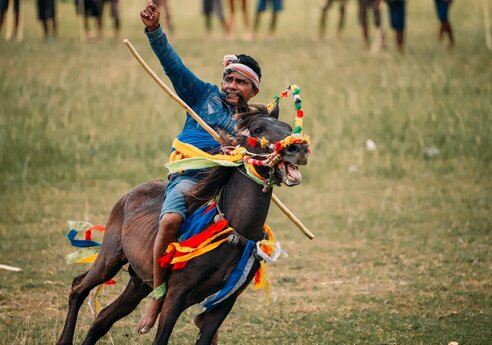
-
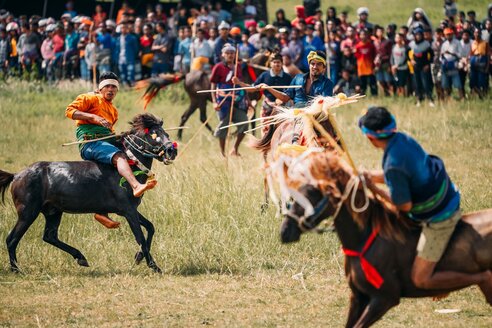
-
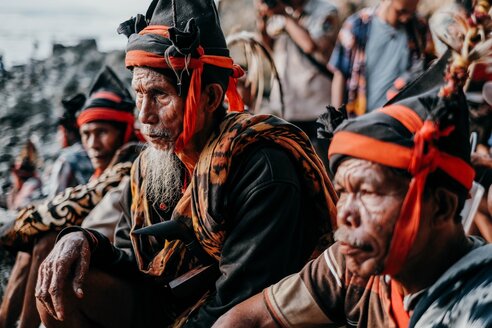
-
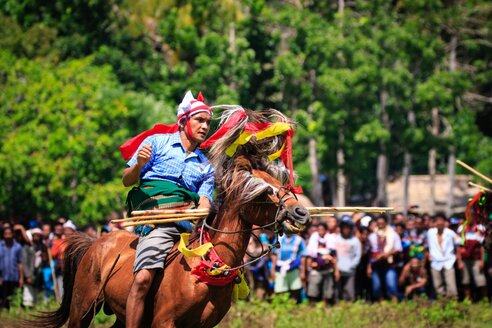
-
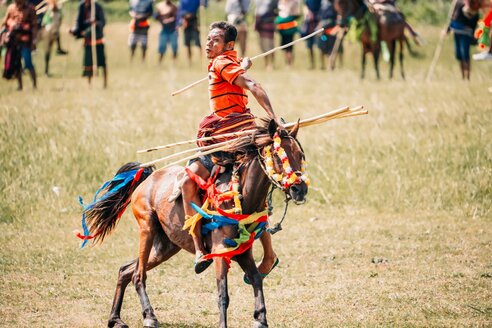
-
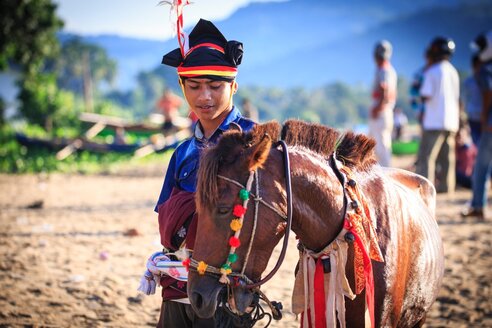
Pasola Festival Highlights
The Pasola Festival unfolds as a dramatic spectacle in the Western part of Sumba, where it serves as a tribute to ancestral spirits. At its heart is a ceremonial battle between two groups of horsemen, typically representing villages from the mountains and villages from costal areas. These skilled riders, 25 in each group, adorned in vibrant traditional attire atop equally decorated horses, engage in a carefully choreographed combat, hurling wooden spears at their opponents. The ceremony begins only after the traditional priest offered prayers and symbolically launches his spear between the assembled groups. This really unique event takes place annually in February and/or March in either Kodi or Lamboya, with the exact dates determined by the Rato, the traditional priest, and announced often less than four weeks before the festival.
The term ‘Pasola’ originates from the local word ‘Sola’/ ‘Hola’, referring to the wooden spears used in the ritual. For the Sumbanese people, this festival represents far more than a spectacle – it embodies their belief in maintaining harmony between earthly and spiritual realms, essential for achieving happiness in both life and afterlife. The ceremony, which often involves ritual bloodshed, serves as the culmination of the Nyale feast celebrations. In the context of the ancestral Marapu religion, Pasola stands as a profound expression of spiritual devotion, carrying forward the mandates of their forebears through each generation.
